| Srl | Item |
| 1 |
ID:
160089
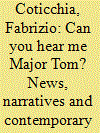

|
|
|
|
|
| Summary/Abstract |
This research explores the relationship between public narratives and the Italian military contribution to the International Security Assistance Force (ISAF) in Afghanistan (2001–2014). Despite attracting little attention in the literature, Italy has been one of the most crucial contributors of multilateral military missions around the world in the post-bipolar era. Italy has remained consistently engaged militarily in Afghanistan over the entire period of the ISAF mission. However, the country’s involvement has been characterised by differing and controversial views and perspectives among Italian political actors and the media. This study aims to reconstruct the core features of the strategic narratives and the media frames around the military intervention and it does so through a Qualitative Content Analysis on a collection of almost 200 articles published by four main Italian national newspapers. The goal of this paper is twofold: on the one hand, we systematically retrace the main discursive patterns and frames employed by the newspapers on the ISAF. On the other, we evaluate whether in the case of military interventions, the Italian media unveil critical inconsistencies and competitive arguments or whether they function as a repeater of the dominant political discourse. Thanks to the case study, we find that the Italian media supported the mainstream narratives.
|
|
|
|
|
|
|
|
|
|
|
|
|
|
|
|
| 2 |
ID:
160087
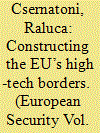

|
|
|
|
|
| Summary/Abstract |
FRONTEX has highlighted Remotely Piloted Aircraft Systems (RPAS) as affordable and efficient capabilities for securing the EU’s vast frontiers in order to further upgrade them into smart technological borders. In this regard, this article examines the EU’s strategy and rationalisations to develop dual-use technologies such as aerial surveillance drones for border management. By drawing on critical security and technology studies and by focusing on their functional technological efficiency, the article argues that drones are being normalised in a technological regime of exclusion at the border-zone. It further contends that high-end technologies such as drones introduce a military bias as security enablers in border surveillance and as a panacea for the consequences of failed policies to manage irregular migration. A closer examination of several EU-endorsed drone projects reveals a pragmatic and industry-driven approach to border security, underlining the evolving homogenisation between internal and external security and the imminent “dronisation” of European borders.
|
|
|
|
|
|
|
|
|
|
|
|
|
|
|
|
| 3 |
ID:
160084
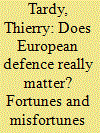

|
|
|
|
|
| Summary/Abstract |
This article examines how the defence component of the Common Security and Defence Policy (CSDP) has been revisited over the last few years. It argues that while the CSDP has grown predominantly as a security – rather than defence – policy, the latest developments that include the creation of a military headquarter, the launching of a Permanent Structured Cooperation (PESCO) and the new role for the European Commission in defence funding, attest to an evolution towards a more central EU defence policy. In the meantime, the article points to some structural impediments to the materialisation of European defence. The momentum says little about the form and finality of military operations that EU states will have to conduct so as to give a meaning to defence in a European context. Moreover, persisting divergences in the EU member states’ respective strategic cultures and institutional preferences – notably vis-à-vis NATO – are likely to continue to constrain European defence self-assertion.
|
|
|
|
|
|
|
|
|
|
|
|
|
|
|
|
| 4 |
ID:
160085
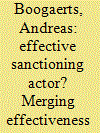

|
|
|
|
|
| Summary/Abstract |
EU sanctions invoked in response to the Iranian nuclear crisis (2006–2016) were long considered to be of limited effectiveness in halting Iran’s nuclear ambitions. Recently, however, sanctions seem to have contributed to a breakthrough in the negotiations over Iran’s nuclear programme. This article aims at explaining this evolution. It, therefore, designs a framework that explains why sanctions (fail to) change targets’ behaviour. Since the sanctions effectiveness literature lacks an integrated framework to explain evolutions in effective coercion, this article merges sanctions effectiveness variables and Bretherton and Vogler’s actorness criteria. Applying the resulting framework to two broad episodes of the Iranian case (2006–2013 and 2013–2016), this article provides a first test of the framework’s added value. It concludes that a full understanding of sanctions effectiveness requires consideration of external, internal, and in-between factors.
|
|
|
|
|
|
|
|
|
|
|
|
|
|
|
|
| 5 |
ID:
160086


|
|
|
|
|
| Summary/Abstract |
This article adds to our understanding of the role of norms in the European Union’s (EU) response to the migration crisis by conducting a critical assessment of the EU’s anti-smuggling naval mission “Sophia”. Is Sophia in line with the normative standards the EU has set for itself in its foreign policies? Conducting the analysis in two steps in line with the main criteria of a humanitarian foreign policy model – first exploring Sophia’s launch and then assessing Sophia’s in theatre behaviour – findings suggest that although concerns for migrants at sea mobilised the initial launch of the mission, the mission is not conducted in line with key human rights principles. As the operation mandate is amended and updated with new tasks, and as the EU-NATO in theatre cooperation increases, the EU is moving further away from what one would expect of a humanitarian foreign policy actor.
|
|
|
|
|
|
|
|
|
|
|
|
|
|
|
|
| 6 |
ID:
160088
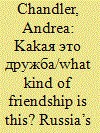

|
|
|
|
|
| Summary/Abstract |
Russia’s 2014 annexation of Crimea without the consent of Ukraine was a rare case of a state taking territory from a state with whom it previously enjoyed friendly relations. The paper seeks to explain the causes and consequences of this annexation by examining theories of democratic peace, constructivism and irredentism. In 1971, political scientist Myron Weiner published an article “The Macedonian Syndrome” in the journal World Politics (vol. 23, no. 4, 665–683). In particular, the paper examines the applicability of Weiner’s theses to Russia’s 2014 attempt to annex Crimea from Ukraine. While Weiner’s theory helps to explain Russia’s moves, his theory can be updated to consider the consequences of those moves. Russia attempted to justify its annexation by transposing the concept of friendship from Ukraine itself to a piece of its territory – Crimea. This transposition rested on a false dichotomy between Ukraine and Crimea, and Russia’s failure to live up to its international commitments to respect Ukrainian borders brought swift consequences in the form of Western sanctions.
|
|
|
|
|
|
|
|
|
|
|
|
|
|
|
|